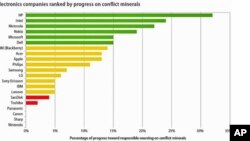A new U.S. report ranking companies on their efforts to stop the use of so-called conflict minerals from eastern Congo in electronic devices shows lots of improvement is needed.
The U.S.-based Enough Project is ranking industry leaders in consumer electronics products that use tin, tantalum, tungsten and gold in their components. The same minerals human-rights groups say continue to fuel the lingering conflict in mineral-rich eastern Congo are essential to electronic devices, such as laptops, mobile phones and video game players.
Tracing the source
Activists are worried companies do not make enough effort to ensure the complex and often opaque route from mine to device does not start in a war-ravaged part of Congo, where renegade soldiers, militias and rebels run rampant.
The new rankings are based on complicated criteria that encompass whether companies trace suppliers, try to find out the origin of the minerals, are developing a certification process, engage with non-governmental organizations and also are getting in line with a new U.S. law trying to stop conflict minerals.
The report includes a graph determining the percentage of progress towards what is called responsible sourcing on conflict minerals, and none of the companies make it to 35 percent.
Determining rankings
The only one deemed above 30 percent is the Hewlett-Packard company. Just below in the 20 to 25 percent category are Intel and Motorola. Toshiba and SanDisk are at the very bottom of this ranking, below 5 percent.
Four companies, Nintendo, Canon, Sharp and Panasonic did not rate any figure on the chart whatsoever.
Policy analyst Aaron Hall said that while some companies are slowly making progress, others are simply ignoring the issue.
"A lot of these companies have no policies on conflict minerals and have largely been absent from the process, the industry process that has been occurring," said Hall. "We try repeatedly to contact some of these companies and we never got a response."
Informing consumers
Hall said there is no coincidence the report was released during the American holiday season, when shoppers look to buy gifts. "This report is driven just as much by consumer demand for some sort of guide or tool for responsible consumption as it a means to kind of put a spotlight on the companies and encourage them as they continue in this process, and so we wanted to meet that consumer demand and be able to give people something to use when they are making decisions."
The report says Apple - the maker of the popular iPhone and iPad - ranks in the middle of the pack, in the 10 to 15 percent group of progress toward responsible sourcing. The company has been the target of several high-profile protests in the United States related to potential conflict minerals.
Coming regulations
Officials at Apple have said a 2010 progress report says one of the minerals, tantalum, poses a particular challenge, since the supply chain consists of many types of businesses, from miners to brokers and refiners. It says it is working to tackle the overall challenge.
Earlier this year, a yet-to-be implemented Wall Street Reform and Consumer Protection Act was passed. It includes requirements for manufacturers to identify and eliminate conflict minerals from their supply chains. The Securities and Exchange Commission is expected to come out with proposed rules later this week, before final guidelines are set
in the middle of next year. Companies will then need to abide by the new rules in 2012.
Officials at ITRI, an organization that supports the tin industry and the expansion of tin use, have called this deadline completely impossible to meet.











